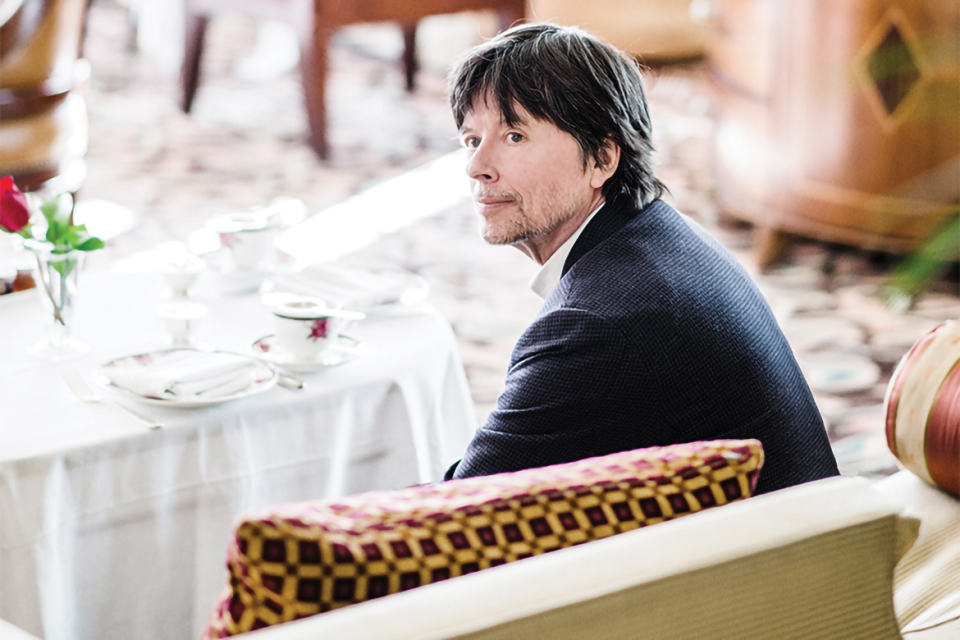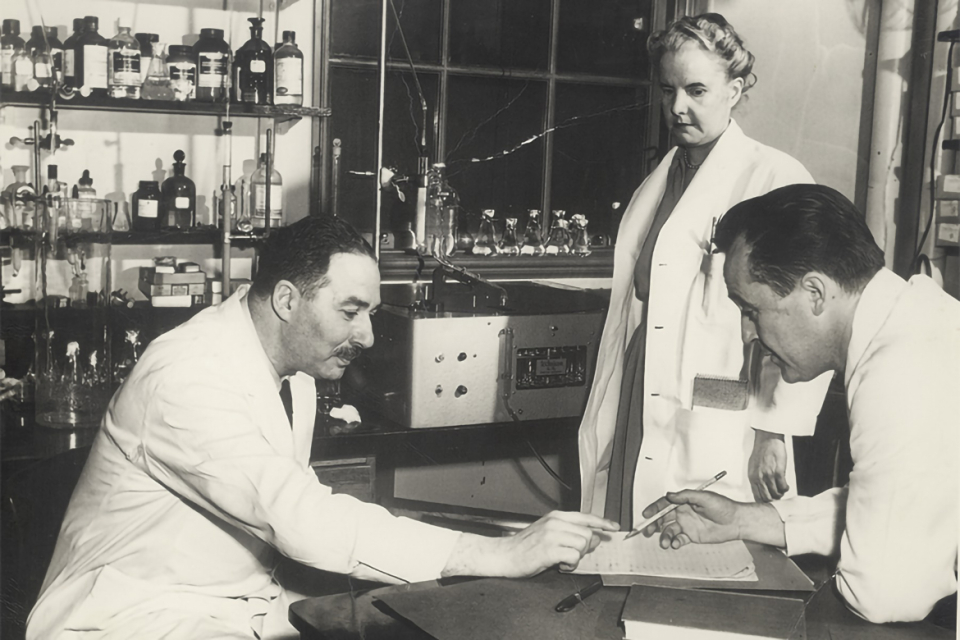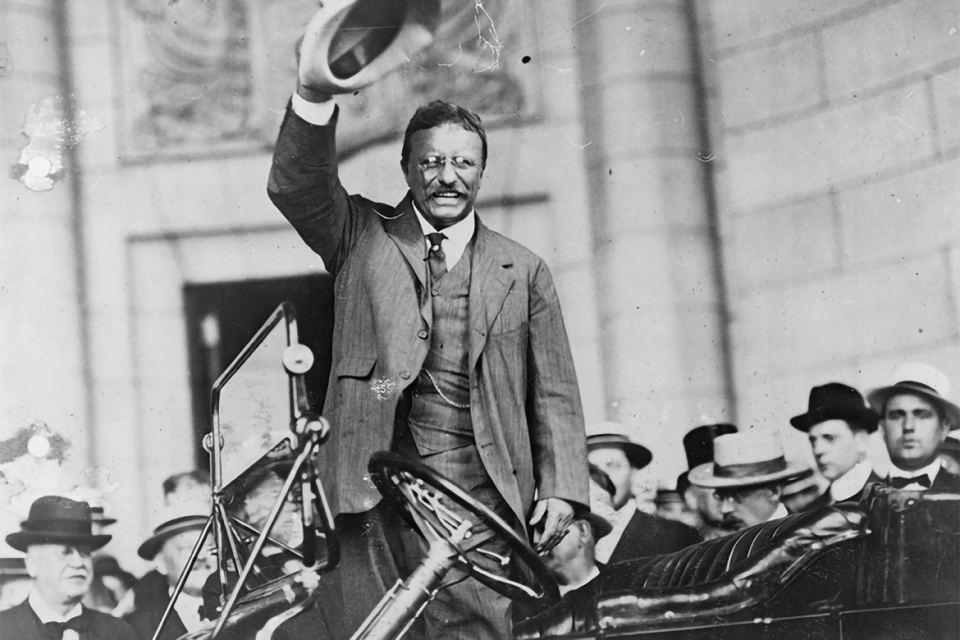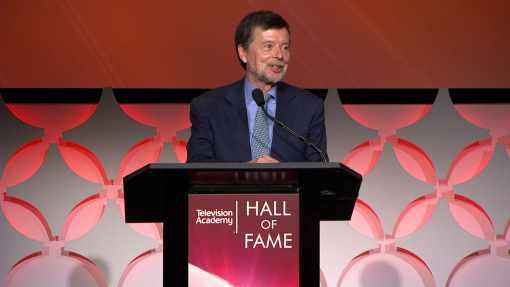Ken Burns may have "reinvented historical documentaries for our generation," as his brother, Ric Burns, puts it, but the Emmy Award-winning director of The Civil War and Baseball is quick to dismiss that kind of talk.
"I don't wake up thinking, 'I'm America's number-one historian and filmmaker,'" Burns says, as if horrified by the thought. "I live in a tiny town in New Hampshire, which I'd be run out of if I put on any kind of pretensions in that regard."
From that tiny town has sprung a remarkable career that's spanned more than 30 years and about as many films. Midway through an exclusive 15-year contract with PBS (it runs through 2022), Burns is working on a range of projects in various stages of production and development.
"It's like planes landing at LAX," he says. "One's just touching down, one's halfway to the gate, one's taking off."
Burns was recently promoting a six-hour PBS documentary that he executive-produced and cowrote, Cancer: The Emperor of All Maladies, which was based on the Pulitzer Prize–winning book by Dr. Siddhartha Mukherjee. Casually dressed in jeans and a gray blazer, Burns has a youthful look and energy that belie his 61 years. If he weren't a filmmaker, one could easily imagine him as a favorite history professor.
He may not have the shock value of a Michael Moore or the subversiveness of an Errol Morris, but no one has brought American history to life more vividly and to so many people. His documentaries are finely observed, scholarly works unmatched in their scope and detail. His potent use of photos, music and voiceovers brings figures from distant eras roaring back to life.
"Ken has a really unusual, acute grasp of reality, an ability to make present the things that are remote in time, things far away from him," says Ric Burns, himself a documentary filmmaker (The Way West). "And he has a tactile grasp of what people want and need and think and feel."
Ken Burns also has a need to dispel the myths of what he calls "conventional wisdom," the often incorrect assumptions that people make based on the public record. Nothing satisfies him more than to make viewers reexamine long-held preconceptions.
Such was the case with his most recent opus, The Roosevelts: An Intimate History. The sweeping 14-hour documentary premiered on PBS last September and was repeated this spring.
"We all have a kind of conventional wisdom about Theodore, Franklin and Eleanor Roosevelt, whether we're aware of it or not," Burns says. "As filmmakers, we were fleshing out complex human beings that have, because of that conventional wisdom, been suffering under the weight of superficial judgment."
Burns and his longtime script collaborator, Geoffrey Ward, had been considering a project on America's most famous political family for years; Ward is the author of two biographies on FDR. Many documentaries have examined the Roosevelts, but no one had thought to link the stories of Theodore, Franklin and Eleanor.
"Ken was the first to say, 'I'm going to take these three characters and tell the full stories on how they were interwoven — all against a backdrop of the biggest events of the last 150 years," says Beth Hoppe, chief programming executive and general manager of PBS.
"Everyone usually had segregated Teddy,” Burns explains, “because he was a Republican and FDR and Eleanor were Democrats. But a good deal of the progressive agenda FDR was able to get through was a continuation of what Teddy had championed in his time as a Republican."
Shot in Burns's trademark visual style, with archival photos (some 2,300 in all), newsreel and private footage, period music, readings of private correspondence and the guiding voice of Peter Coyote's narration, the story spans some of the most transforming years in American history. It begins with Teddy Roosevelt's birth in 1858 and ends with Eleanor's death in 1962.
The first three episodes recount "Rough Rider" Teddy's scrappy rise through New York politics, the building of the Panama Canal and his ascendancy to the presidency at 42. But a miscalculated pledge not to seek a third consecutive term sends his political fortunes into a steady decline from which he never recovers. By episode four, the focus has shifted to the rapid rise of fifth cousin Franklin and his wife, Eleanor, who was Teddy's niece.
The film faithfully tracks FDR's well-chronicled public accomplishments as he leads the country out of the Depression and through World War II. But where it really shines is in illuminating the complex entanglements of FDR and Eleanor's marriage, making for a gripping narrative that Hoppe likens to PBS's popular Masterpiece offering, Downton Abbey.
"There're a lot of soap-opera-like things that happened in their personal relationships," says Hoppe. "There's the betrayal — when Eleanor finds out FDR was with his former lover when he died — and that it was his own daughter that hooked them up to see each other. Eleanor's dealing with her grief, but at the same time, she has to lead, because the country has lost its president. Ken did an amazing job of capturing a complex human experience without sensationalizing it."
The film also offers a rare glimpse into FDR's battle with polio, a struggle largely hidden from the public, thanks to his deft control of the media. Co-scripter Ward, who was similarly afflicted as a child, handles this area with particular empathy.
"You have the sense of FDR as someone you've always seen standing, but if you look closely, "Hoppe says, "there's always someone ready to hold him up, and you never see him walking. It was a whole level of what he had to overcome that I hadn't seen before."
Adding to the intimate history are eloquent readings of letters and private journals from a star-studded cast, notably Meryl Streep as Eleanor, Paul Giamatti as Teddy and the late Edward Herrmann as FDR. Others, some in multiple roles, include Ed Harris, John Lithgow, Amy Madigan, Billy Bob Thornton, Eli Wallach and Patricia Clarkson, who voices previously unheard letters from FDR's secret companion, Margaret "Daisy" Suckley.
Historians such as George Will, Doris Kearns Goodwin and James Meacham provide expertise, as do a half-dozen Roosevelt biographers, including Ward.
"I never make films about something I know about," Burns says. "When I started Baseball, I declared this was something I'd known and played since I was a kid. Three weeks in, I understood I knew zero."
By the time he finished researching the Roosevelts, Burns recognized that all three were deeply flawed heroes, and he portrayed them as such. "Theodore was a black-and-white moralist, a lover of war. He pushed his sons into combat in WWI and tragically lost his youngest.... FDR was incredibly secretive and manipulative; Eleanor could be very self-righteous.
"Our films," Burns notes, "do not participate in hagiography."
When it first aired, The Roosevelts became a cultural event, drawing more than 33 million viewers for what would be PBS's most-watched week since 1994, when Baseball captured the nation's attention during the Major League Baseball Players Association's strike. The Roosevelts also became the first of Burns's films to be made available for streaming, starting the day after the premiere.
"We found people didn't use it to jump ahead, but to catch up and jump back into the broadcast," Hoppe says. "There was a shared viewer experience, and a kind of water-cooler talk about it. It was an event, a real buzzy event."
Born in Brooklyn but raised in Ann Arbor, Michigan, Burns got his first serious exposure to movies from his father, a cultural anthropologist who introduced his sons to silent films, the French New Wave and American classics. "The first time I saw my dad cry,” Burns recalls, “I instantaneously understood the power of film.”
It was not a happy childhood. When he was 11, his mother died after an eight-year battle with cancer, and Burns, who shared a tiny bedroom with his brother, remembers the house as "a grim and demoralizing place." Film was his great escape.
At Hampshire College in Amherst, Massachusetts, Burns wanted to follow in the footsteps of the Hollywood feature directors he idolized: John Ford and Howard Hawks. But after being mentored by renowned still photographers, including Jerome Liebling, he developed a new sensibility.
"They reminded me that there's as much drama in what is as what was, and that the facts of now and of the past are as dramatic as stuff that's made up.”
After graduating college in 1975, Burns formed his current production company, Florentine Films. In 1981, his first documentary, Brooklyn Bridge, was nominated for an Oscar.
During this period he developed the distinctive shooting style that enables him — through closeups, music, voiceovers and sound effects — to convey the illusion of an extended action sequence with a single photo. (His slow zooms and pans would become known as the "Ken Burns effect," a technique so widely emulated that Apple computers incorporated it, name and all, as a feature in iMovie and iPhoto.)
"I felt that a lot of history films that used pictures did so reluctantly — they held them at arm's length," Burns says. "I wanted to trust that that picture was a frozen moment of something that had a past and would have a future... where the troops are tramping, the bats are cracking, the crowd's cheering, the ice cube's tinkling in the bar of the jazz club.... I wanted to treat that photo as a master shot that the old feature filmmaker in me wanted it to be."
Ric Burns describes the process this way: "He would see and feel in that photo the resonance of human lives that gather around it. There was already motion in the picture — you just had to see it and feel it. These images are so alive, they're speaking stories."
After a short run at film festivals, Brooklyn Bridge found a wider audience on PBS, and a beautiful friendship was born.
PBS would prove the perfect outlet for Burns's increasingly ambitious projects, and after a number of smaller films (The Statue of Liberty, The Congress, Huey Long), Burns broke through on the national stage with his landmark miniseries The Civil War. It aired on five consecutive nights in September 1990, setting a record for the highest-rated broadcast in PBS history. The record still stands.
Burns told the story through the eyes of the participants themselves, using their journals and letters to make the 125-year-old event resonate personally for a modern TV audience. Ken recruited his brother Ric, then pursuing a teaching career, to work on the film as coproducer and cowriter.
It was a fitting payoff to the Blue vs. Gray reenactments the brothers had staged as children, wherein older brother Ken always played the victorious Union soldiers. ("I don't know how many times I lost the Civil War," Ric recalls, laughing. "If I wasn't losing, I was the chief lieutenant to Ken.")
More than five years in the making, The Civil War proved a transformative experience for both. Ric left his brother's fold to embark on a directing career of his own, and Ken, though exhausted from the film's arduous grind, made an important self-discovery: "I got a kind of shadow of PTSD. Having stared at the deaths of Americans killing Americans, I vowed I would never do another film on war.”
Any Burns fan knows that vow didn't last. He's since made a 15-hour film about WWII, The War, and is currently finishing an 18-hour epic on the Vietnam War.
"I realized I couldn't stay away from that subject," Burns says. "The Civil War, like all wars, reveals the best and worst of us. They are the apotheosis of human behavior and actions, good and bad. If you're trying to understand who we are as a country, then wars become incredibly instructive."
Prepare to be instructed again. On the 25th anniversary of its original broadcast, a restored and remastered The Civil War will air on PBS September 7–11. Burns is excited: "For the first time, viewers will see what I saw when I looked through the lens of my camera. It is truly remarkable."
The Civil War was the first of a trilogy of epic docs that continued with the Emmy-winning, 20-hour Baseball and concluded with the 19-hour, 10-part Jazz, which NBC's Tom Brokaw called "a masterpiece of American television."
With the exception of Cancer: The Emperor of All Maladies, which PBS brought him, Burns initiates all of his projects.
"PBS has already committed to a certain percentage of funding [usually 10–15 percent], and I raise the rest, from foundations, corporations, granting agencies, individuals," Burns says.
His production slate is packed with projects steeped in Americana. There's the aforementioned documentary, Vietnam, a shorter film on the life of Jackie Robinson, a seven-part series on the history of country music that's targeted for 2018, and a four-hour biography of Ernest Hemingway slated for either 2019 or 2020.
"I have hundreds of ideas in my head," Burns says happily. "I could be given a thousand years to live, and I wouldn't run out of good topics in American history."














